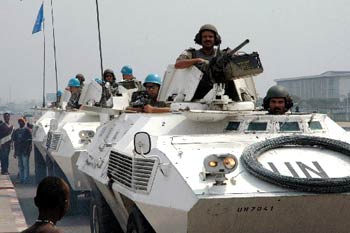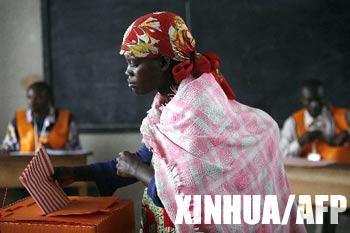 Soldiers of the United Nations peacekeeping force in the Democratic Republic of Congo (DRC) patrol on a street in Kinshasa, DRC's captial, July 29, 2006. (Xinhua Photo) |
With voting process officially starting from 6:00 a.m. (0700 GMT) on Sunday, voters queued outside polling stations, eager to make their choices from 33 presidential candidates and more than 9,700 legislative candidates vying for 500 seats in the National Assembly.
"I care about whether the candidates can bring us security, justice, development and stability, " said Morgan Kunga, a 40-year-old guard, who stood at the head of the line at the polling station nearest from the Independent Electoral Commission based in the capital of Kinshasa.
Kunga said investors do not dare to come if security cannot be guaranteed.
Bantobueji Luse Celespin, an agent of the Independent Electoral Commission, shared Kunga's view, saying that he hoped, through the elections, his country would become a country governed by law so that it would attract foreign investment and develop.
Sylvie Feruei, who is jobless and at her 30s, said she wanted to vote although she had no clear idea about whom to vote for.
"Life is too hard, I hope the elections could bring changes to it," she said.
|
Backgrounder |
| ¡¤Key events in DR Congo peaceful process |
| ¡¤Main candidates in DRC's presidential election |
| ¡¤Key facts about the Democratic Republic of Congo |
The voters queued quietly at the designated area, waiting to cast their ballots.
Voting at No.1 ballot area, where the station was located, began about one hour later than the official start time as international observers and party representatives who watch the elections did not arrive on time, according to Pansy Tlakula, chief electoral officer from South Africa.
Tlakula said this was a result of lack of experience in organizing elections, but the elections were overall "well-organized."
According to an election official, 25.7 million voters will cast their ballot at 49,746 polling stations across the country, 8,518 stations of which are in Kinshasa.
The result will be known three weeks later. If no candidate gains over half of the ballot, a second round of voting will be held.
Twenty blue helmit, with one armored vehicle, were deployed at this polling station, being part of the 17,000-strong United Nations peacekeeping force in the DRC, the world body's biggest mission.
The eastern part of Kinshasa, where opposition enjoys mass support, has remained calm and reported no violence, said an officer of the UN troops.
The European Union also dispatched 1,100 peacekeepers, 200 of which are combat troops, to assist the DRC in the historic general elections.
The international community has donated 422 million U.S. dollars to assist the historic elections, with the European Union being the biggest contributor and more than 1,700 international observers have arrived in the country to monitor the voting and counting process to ensure transparency.
The DRC, with an area of 2.34 million sq km, is the third largest country on African continent. Though rich in natural resources, the former Belgian colony remains one of the poorest countries in the world due to continuous war and instability, especially in the eastern part of the country. Enditem
 A woman casts her ballot in the eastern Democratic Republic of Congo July 30, 2006. (Xinhua/AFP Photo) |
Related articles
- • European Union Sanctions Rwanda and M23 Officials over Congo Conflict (March 17, 2025)
- • Canada and Germany Impose Sanctions on Rwanda for Supporting M23 Rebels (March 4, 2025)
- • European Union Suspends Defence Consultations with Rwanda (February 24, 2025)
- • DR Congo Citizens Head to Polls to Elect President, Members of Parliament (December 20, 2023)
- • Constitutional Court Declares Tshisekedi Winner of Presidential Election (January 19, 2019)
- • Martin Fayulu Challenges Presidential Election Results in Court (January 12, 2019)
- • Felix Tshisekedi Vows to Be the President of All Congolese (January 10, 2019)
- • Martin Fayulu Rejects Presidential Election Results (January 10, 2019)
- • Felix Tshisekedi Elected DR Congo President (January 10, 2019)
- • DR Congo Delays Results of December Election (January 6, 2019)
- • Bemba, Katumbi renew their support for joint opposition presidential candidate Fayulu (November 16, 2018)
- • Vital Kamerhe also withdraws support for joint opposition presidential bid (November 12, 2018)
- • Felix Tshisekedi withdraws support for joint opposition presidential bid (November 12, 2018)
- • Jean-Pierre Bemba banned from running for president (August 25, 2018)
- • Vital Kamerhe named UNC presidential candidate (August 4, 2018)
- • Bemba says Katumbi should be allowed to run for president (August 4, 2018)
- • Moise Katumbi blocked from entering DR Congo (August 3, 2018)
- • Jean-Pierre Bemba Returns to DR Congo (August 1, 2018)
- • Jean-Pierre Bemba named MLC presidential candidate (July 13, 2018)
- • Botswana Urges Joseph Kabila to Step Down (February 26, 2018)
- • No elections in DR Congo in December without electronic voting machines: INEC (February 13, 2018)
- • US Warns DR Congo Against Electronic Voting for Delayed Election (February 12, 2018)
- • Presidential election scheduled for December 23, 2018 (November 5, 2017)
- • Felix Tshisekedi accuses INEC of illegally prolonging Kabila's mandate (October 24, 2017)
- • DRC Seeks Arrest of Presidential Candidate Moise Katumbi (May 19, 2016)
- • Political tensions 'running high' in DR Congo ahead of 2016 elections (October 7, 2015)
- • Rights Groups: DR Congo Must Free Pro-democracy Activists (April 13, 2015)
- • Electoral commission sets DR Congo presidential election date (February 12, 2015)
- • Police Open Fire on Crowd Protesting Election Law Change (January 19, 2015)
- • Denis Mukwege Wins Sakharov Prize 2014 (October 21, 2014)







